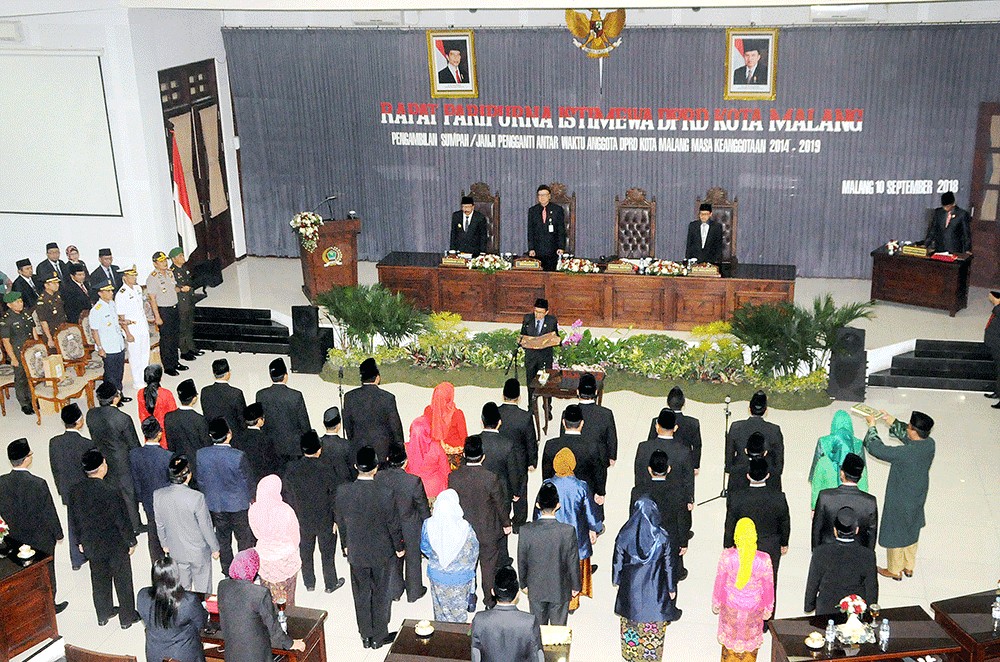Popular Reads
Top Results
Can't find what you're looking for?
View all search resultsPopular Reads
Top Results
Can't find what you're looking for?
View all search resultsVote graft convicts out
The arrests of 44 members of the Malang Council are the latest example of rampant corruption in legislative institutions and its deleterious impact on local governance.
Change text size
Gift Premium Articles
to Anyone
 The replacements: New members of the Malang Legislative Council are inaugurated in Malang, East Java, on Sep. 11, in the wake of a recent finding by the Corruption Eradication Commission (KPK) about 41 legislative members’ alleged involvement in a bribery case related to 2015 budget deliberations. (The Jakarta Post/Nedi Putra AW)
The replacements: New members of the Malang Legislative Council are inaugurated in Malang, East Java, on Sep. 11, in the wake of a recent finding by the Corruption Eradication Commission (KPK) about 41 legislative members’ alleged involvement in a bribery case related to 2015 budget deliberations. (The Jakarta Post/Nedi Putra AW)
T
he idea behind the General Elections Commission’s (KPU) decision to issue a regulation banning former graft convicts from running in elections is quite simple: cutting the chain of corruption that continues to shackle the country’s legislative bodies. The arrests of 44 members of the Malang Council are the latest example of rampant corruption in legislative institutions and its deleterious impact on local governance.
But the regulation proved to be too controversial, and the backlash against it was swift. The Elections Supervisory Agency (Bawaslu) decided to ignore the regulation and allowed scores of former graft convicts to run in the 2019 legislative elections. Bawaslu founded its decision on the argument that the KPU regulation was not consistent with the Election Law, which does not go into too much detail regarding who can run in legislative elections.
Also, a number of former graft convicts took their fight against the KPU regulation to the Supreme Court. Initially, Supreme Court officials were hesitant to join the debate, arguing that the court was unable to hear the case as the Constitutional Court was handling several judicial review petitions challenging articles under the 2017 Elections Law, which serves as the basis of the regulation. Not exactly a moral beacon in the country, the court ruled late last week practically in favor of ex-graft convicts.
The court said in its ruling that the regulation banning people convicted of sexual assault, drug abuse or corruption from legislative office contradicted the 2017 Elections Law. The ruling should not come as a surprise. If anything, the Supreme Court appeared to also have no reservations about defending the interests of only two dozen political candidates whose chances of running for office has been diminished by the KPU. With the ruling, the Supreme Court has also stood in defense of only a handful of political parties, which has defied the regulation against nominating former graft convicts.
Data from poll watchdogs has revealed the identities of candidates and political parties whose interests have been defended by the Supreme Court. These politicians came from some of the biggest parties, including the Gerindra Party, which nominated five former graft convicts. The National Mandate Party (PAN) came in second with four.
Having seen this list, we should, however, be emboldened by the fact that some political parties, including the party of President Joko “Jokowi” Widodo, the Indonesian Democratic Party of Struggle (PDI-P), the National Awakening Party (PKB), the United Development Party (PPP) and the newly established Indonesian Solidarity Party (PSI), abide by the KPU regulation.
As the Supreme Court’s decision is final and binding, there is no room to contest it. We may push lawmakers to amend the Elections Law so as to keep legislative bodies free of graft convicts, but this will not materialize anytime soon.
It is incumbent upon us, the voters, now to look closely at legislative candidates nominated by the well-intentioned political parties and punish graft-tainted candidates. It’s a free market out there — vote for clean candidates.









